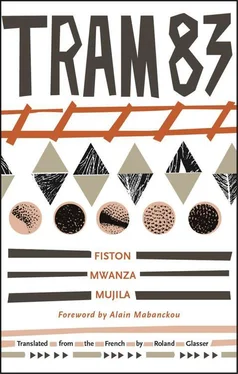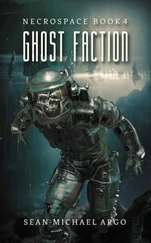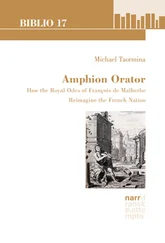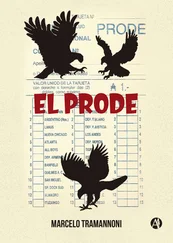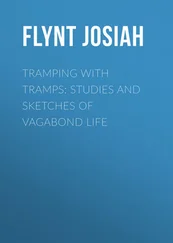“You’ll get five percent per sack, that’ll teach you to chase other people’s wives.”
“Buy me a dress.”
“Give me your pants.”
“Do you have the time?”
In the distance: first light, music, fatwas, angelus bells, the laughter of the post-adolescent baby-chicks, the single-mamas with spoiled breasts, the Tram busgirls and waitresses, the strike and its students, the desperados and their dogs, the dissident rebels and their desire for rape, the local mayor bringing out his fifteen sacks of heterogenite, the publisher with a single-mama-post-baby-chick, the screeching of the rails, the tragic lamentations of the Railroad Diva, the haze, the melancholy of a life premeditated.
ARREST, OR THE BOOKS OF REVELATION, CORINTHIANS, EPHESIANS, GENESIS, GALATIANS, THESSALONIANS, AND COLOSSIANS 2:21–23.
Lucien started running like a hare through the complex of Hope Mine. He knew what awaited him in the event he was arrested. He heard something like snapping sounds behind him, but each time he turned around, there was no one there. He stumbled, lay down on his front, caught his breath. His head swam with all those tales of guys caught red-handed in Polygon 64 of Hope Mine who got beaten up. The dissident General, in one of his ten-hour speeches, of which eight and a half hours were devoted to minerals and locomotives, reiterated that nobody had the right to wander about these sites unless they had an authorization signed by his own hand. The Negus retorted with RULE NUMBER 5: both the mines and the train tracks belong to us, but there are some whose superiority complex makes them believe that life began with them, and so they appropriate our resources.
Lucien thought about everything this notebook contained, about Jacqueline and about Émilienne. Would he have made Émilienne’s acquaintance if the Negus hadn’t insisted he take some girls home with him that evening? He loved her like his sister, something nobody wanted to believe. There’s no such thing as friendship between a man and woman. He held her in esteem, perhaps because she was the only one of the Tram’s dream girls to not necessarily seek to squeeze money out of a man. Émilienne clung to him out of hope he’d give in. But Lucien had no need whatsoever of a fling with her. He cared about his marriage to Jacqueline. He told her he was officially married and that he couldn’t allow himself a one-night stand. The truth is that he was incapable of achieving closure. All the people who came to the City-State started by first achieving closure of their previous life, whether they be tourists, baby-chicks, or diggers.
The whole Tram told him that given how much he worked, and that he was still of this world, he should consume the forbidden fruit with her, for his own good. Anyone who reproached him for not flirting with the baby-chicks of Tram 83 he called a pervert. But, please, what is so perverse about picking someone up at the Tram and spending a cozy night with her, not forgetting the carnal and material advantages? What is so perverse about driving a baby-chick to the edge of ecstasy? What is so perverse about assisting through compensation a single-mama on the edge of financial misery? He said he’d never touched her, and that when he took her back to his room, he’d simply spent the night asking her questions about the City-State.
He ran for a good while more, stepped one-by-one over the high-tension lines installed at knee height. Crossed the sheds. Hurried into the cave. Nothing, except the smell of Mortal Combat’s breath. He rushed outside of the subterranean gallery. A few yards away sat the locomotive on which he had stood guard. He rummaged about, picked up the notebook, and scarpered. He repeated spasmodically the prayers learned in his youth. Revelation 12, verse 3. Books of Corinthians and Malachi. Psalms 40. Genesis 8:3–9. Psalms 17. The Eternal is my light and my salvation: whom should I fear? The Eternal is my life’s strength: of whom should I be afraid?
Psalms 27, verse 1.
5:52 A.M.
He heard something like barking. He didn’t know any other exits. He darted toward the gate. Opposite him, just in front of the exit, with their dogs, cigarettes, chains, whips, and sticks, the nonchalant desperados chuckled.
They walked huge dogs, despite the fact that cats, dogs, and rats (barbecued with potatoes and accompanied by chili peppers and an ice-cold beer) were hunted throughout the City-State in the same way as diamonds and chlorine. A question the tourists ask themselves: why do the needy, the homeless, vagrants, and other whackos often have huge dogs in tow? Sociologists, anthropologists, and other veterinarians have their plates full. Could they even explain this kind of eccentricity? All the suburbs were in desperate search of dogs to stuff in the oven, while these others doted on such critters despite their hunger. Perhaps a research avenue for humanities students, suggested the Negus more than once; for example: “Neighborly or Poetical Relations of an Urban Migration. Street Folk and Stray Dogs: A Socio-critical Essay.”
Even the dissident General’s eldest son expounded, with a jazz player’s regret, on what he called “the wasted tenderness thrown into the shithouse of humanity.” He explained to us that in Europe, many people own little dogs, which they shower with tenderness while he, with all the tenderness he was missing during his long journeys, yearned, alone, like the single locomotive at platform 76. He said that, what with his amputated leg, he sometimes dreamed of being a European dog, a wire fox terrier or a West Highland White Terrier, enjoying all of these expressions of tenderness. In his own words: “Just imagine, in the middle of Paris, clothes shops for dogs, food shops for dogs, playrooms for dogs, hospitals for dogs, casinos for dogs, weight rooms for dogs, and even dogs who go on vacation, skiing, swimming, kite-flying …” He grew sadder still as he mentioned a woman who had tried to commit suicide three times because her poodle ran away. He said there was a considerable advantage in being a dog of small build: “You won’t sleep outside, and women and children love you, showering you with a thousand gifts, opening their bedroom doors to you, no kennel, I mean it.” All his conversations revolved around these European dogs who plunder you for human tenderness.
“Once in Paris,” he said, “I was staying with a woman friend on Rue du Château, libraries and supermarkets for dogs from end to end. One Christmas afternoon, we went out for a jaunt on the Champs-Élysées. Imagine my sorrow: men, women, and children accompanied by their dogs. ‘I can’t bear to watch this spectacle any more. I need a little attention and love, and you just throw all that overboard!’ Seeing my distress, my friend got all bogged down in explanations: ‘It’s hard to make you understand what I want to say to you. We are sensitive to these domestic animals who imbue our daily lives with a certain order in the exactitude of our comfort, given that we subject ourselves willingly to their ways of being and that we react to the ambiguity of our primordial identity.’”
Lucien stopped, wanted to double back.
“Evening, sirs.”
They advanced toward him. The dogs chuckled.
There were around twenty of them.
“What do you want with me?”
Lucien quivered with fear.
One of them, most likely their leader:
“Where you from?”
“Please …”
The dogs continued to chuckle.
“I came accompanied by some friends and then …”
Six in the morning. It was nearly daybreak.
“If you want us to spare your life, tell us where you’ve stashed the merchandise.”
Two dogs padded forward, began sniffing at his legs.
They came closer, pulling out their arsenal of daggers, knives, bayonets, slingshots, screwdrivers.
Читать дальше
